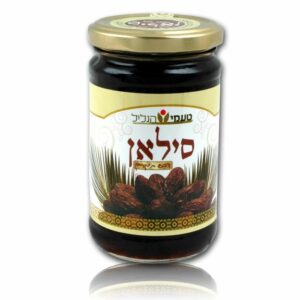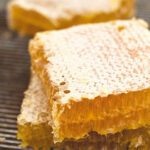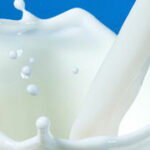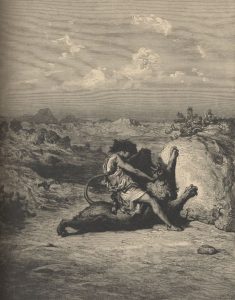Metzorah Haftara – Four Lepers
Melachim II ch. 7.
18 And it came to pass, as the man of God had spoken to the king, saying: ‘Two measures of barley for a shekel, and a measure of fine flour for a shekel, shall be to-morrow about this time in the gate of Samaria’; 19 and that captain answered the man of God, and said: ‘Now, behold, if the LORD should make windows in heaven, might such a thing be?’ and he said: ‘Behold, thou shalt see it with thine eyes, but shalt not eat thereof’;
מלכים ב פרק ז
(יח) וַיְהִ֗י כְּדַבֵּר֙ אִ֣ישׁ הָאֱלֹהִ֔ים אֶל־הַמֶּ֖לֶךְ לֵאמֹ֑ר סָאתַ֨יִם שְׂעֹרִ֜ים בְּשֶׁ֗קֶל וּֽסְאָה־סֹ֙לֶת֙ בְּשֶׁ֔קֶל יִהְיֶה֙ כָּעֵ֣ת מָחָ֔ר בְּשַׁ֖עַר שֹׁמְרֽוֹן:
(יט) וַיַּ֨עַן הַשָּׁלִ֜ישׁ אֶת־אִ֣ישׁ הָאֱלֹהִים֘ וַיֹּאמַר֒ וְהִנֵּ֣ה יְקֹוָ֗ק עֹשֶׂ֤ה אֲרֻבּוֹת֙ בַּשָּׁמַ֔יִם הֲיִהְיֶ֖ה כַּדָּבָ֣ר הַזֶּ֑ה וַיֹּ֗אמֶר הִנְּךָ֤ רֹאֶה֙ בְּעֵינֶ֔יךָ וּמִשָּׁ֖ם לֹ֥א תֹאכֵֽל
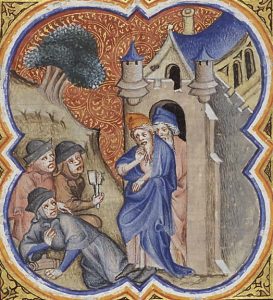
This is the point of the Haftarah. We are placed outside the gates of the city which is the abode of lepers. Hadad, King of Aram, was laying siege on the city. The Lepers, like everyone else, were on the verge of starvation. They decided that they would not find food in the city. Instead they tried their luck to see what would happen if they went to the Aram encampment. It need not be stated what kind of welcome four Jewish lepers, who were certainly odorous, could expect from the besieging forces of Aram.
וַאדֹנָי הִשְׁמִיעַ אֶת-מַחֲנֵה אֲרָם, קוֹל רֶכֶב קוֹל סוּס–קוֹל, חַיִל גָּדוֹל; וַיֹּאמְרוּ אִישׁ אֶל-אָחִיו, הִנֵּה שָׂכַר-עָלֵינוּ מֶלֶךְ יִשְׂרָאֵל אֶת-מַלְכֵי הַחִתִּים וְאֶת-מַלְכֵי מִצְרַיִם–לָבוֹא עָלֵינוּ. ז וַיָּקוּמוּ, וַיָּנוּסוּ בַנֶּשֶׁף, וַיַּעַזְבוּ אֶת-אָהֳלֵיהֶם וְאֶת-סוּסֵיהֶם וְאֶת-חֲמֹרֵיהֶם, הַמַּחֲנֶה כַּאֲשֶׁר-הִיא; וַיָּנֻסוּ, אֶל-נַפְשָׁם.

When the lepers arrived at the encampment they found it empty. Apparently the Aramenians had escaped in a hurry. They left all of there horses and food. We are then informed by the Navi Prophet that G-d had made sounds of a multitude which was going to attack the encampment of Aram. When they heard thousand of horses racing at the camp they headed for the hills leaving behind all their valuables.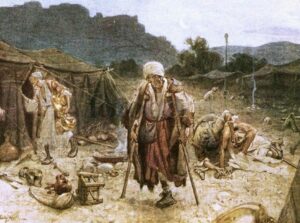
The hungry lepers devoured all that they could eat and plundered what valuables they could collect. They then decided that it would be nice to tell the Jewish people of the city that the siege had miraculously ended.
Upon hearing the news of the abandoned encampment the king and his advisers could not believe what had happened. The king suspected that the Aramenians had planned an ambush attack. One of the kings servants suggested that they send five horses from what was previously the great Jewish Cavalry. This cautious discussion reminds the reader of a similar discussion which had earlier taken place between the four lepers. The Navi would like to tell us that their is no real difference between a king and smelly lepers.
The Jews cautiously investigated whether it was true that the Aramenians had abandoned their camp. When they found booty thrown all over the path leading from the encampment, they realized that it was true that they had totally abandoned everything.
וַיֹּאמֶר אֱלִישָׁע, שִׁמְעוּ דְּבַר-יְהוָה: כֹּה אָמַר יְהוָה, כָּעֵת מָחָר סְאָה-סֹלֶת בְּשֶׁקֶל וְסָאתַיִם שְׂעֹרִים בְּשֶׁקֶל–בְּשַׁעַר שֹׁמְרוֹן. ב וַיַּעַן הַשָּׁלִישׁ אֲשֶׁר-לַמֶּלֶךְ נִשְׁעָן עַל-יָדוֹ אֶת-אִישׁ הָאֱלֹהִים, וַיֹּאמַר, הִנֵּה יְהוָה עֹשֶׂה אֲרֻבּוֹת בַּשָּׁמַיִם, הֲיִהְיֶה הַדָּבָר הַזֶּה; וַיֹּאמֶר, הִנְּכָה רֹאֶה בְּעֵינֶיךָ, וּמִשָּׁם, לֹא תֹאכֵל.
The day before this incredible miracle Elisha the Prophet had told the king, “tomorrow a Seah of Solet Flour will be a Shekel and two Seah of wheat will be a Shekel.” The king’s adviser had sneered at Elisha asking if G-d would open up the storehouses of Heaven to feed Israel. Elisha told this scoffer, “your eyes will see it but you will not eat from there.”
After entering the Aramenian camp flour, indeed, sold for as little as Elisha had prophesied.
The king’s adviser was appointed to oversee the hoards of people racing to get at the food. The adviser was standing on a platform snidely overseeing the people. The platform broke and the adviser was then trampled to death.
This story demonstrates that G-d does not need an army to overthrow the greatest military powers. He also does not need spies to pass on the weaknesses of the enemy. Four lepers will do just fine.
The snide wording used by the kings adviser asking if G-d would open the storehouses of heaven should remind you of the guarantee given to Benei Yisrael by Malachi. Malachi said that if the people will not be cheap and give their tithes and then G-d will, “open the storehouses of Heaven and I will give you unending blessing.”
It is easy to believe G-d does not intervene in Economics, but that seems to be a lesson of this Haftara.
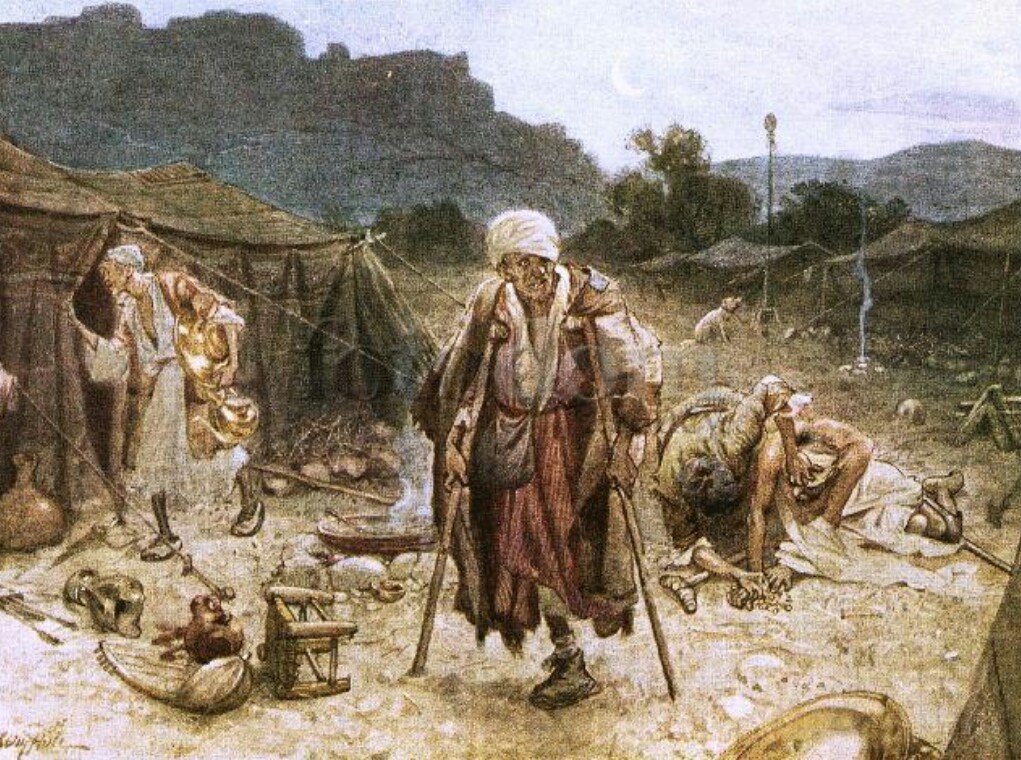


 Riesh Lakish was an Emora during the Talmudic period. He says that he saw a lamb grazing under a fig tree dripping with honey. The lamb itself was dripping its milk onto the honey. He said that this represented the land flowing with milk and honey. (Ketubot 111b)
Riesh Lakish was an Emora during the Talmudic period. He says that he saw a lamb grazing under a fig tree dripping with honey. The lamb itself was dripping its milk onto the honey. He said that this represented the land flowing with milk and honey. (Ketubot 111b)